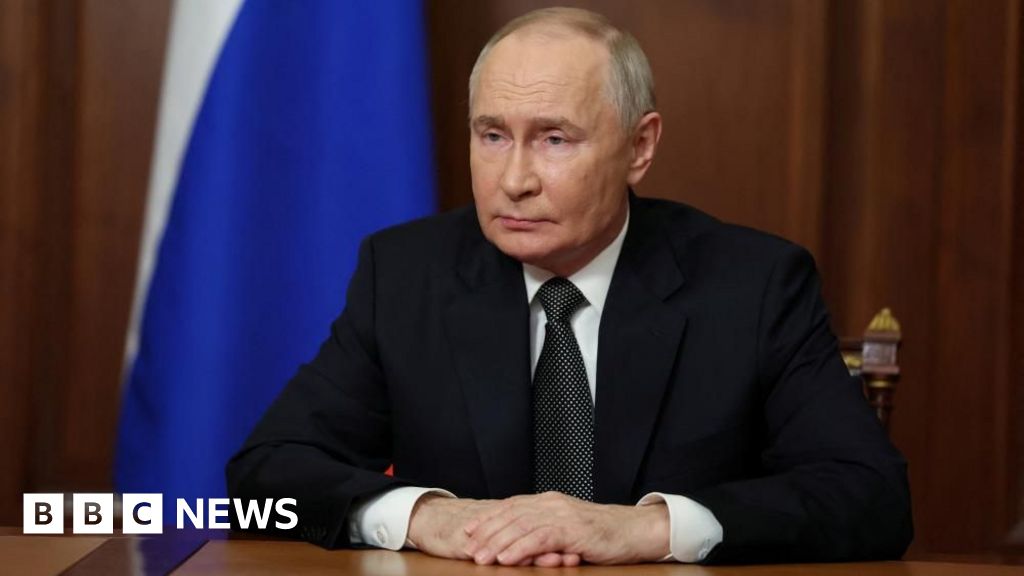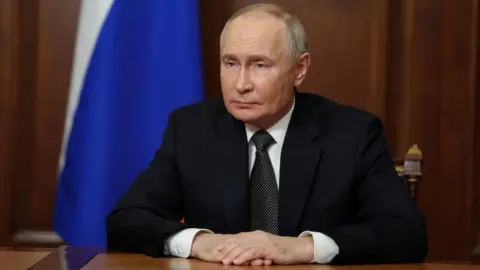What will Putin do next?

 Reuters
Reuters“What will Vladimir Putin do next?”
It’s a question I’ve been asked a lot this week.
Understandably so.
After all, this was the week the Kremlin leader lowered the threshold for the use of Russian nuclear weapons.
It was the week the US and UK crossed (another) Putin red line, allowing Ukraine to fire Western-supplied longer-range missiles into Russia.
It was also the week that President Putin, in effect, threatened the UK, America and any other country supplying Ukraine with such weapons and for such a purpose.
“We consider ourselves entitled to use our weapons against the military facilities of those countries that allow their weapons to be used against our facilities,” the Russian leader said in an address to the nation on Thursday evening.
So, you can see: “What will Vladimir Putin do next?” is a most pressing question. And, since I’m the BBC’s Russia Editor, you might expect me to have the answer.
I’ll be honest with you. I don’t.
Perhaps even Putin doesn’t know the answer, which makes things even more serious.
Instead of answers, some observations.
Embracing escalation
This week the Kremlin accused the “collective West” of escalating the war in Ukraine.
But nearly three years of war in Ukraine have shown that it is Vladimir Putin who embraces escalation as a means to achieving his goals – in this case, control over Ukraine or at the very least peace on Russia’s terms.
Putin’s full-scale invasion of Ukraine, his decision to declare four Ukrainian territories part of Russia, his deployment of North Korean troops to Kursk region, his decision on Thursday to target the Ukrainian city of Dnipro with a new intermediate-range hypersonic ballistic missile, followed up by threats to strike the West – all of these represent moments of escalation in this conflict.
I once described Vladimir Putin as a car with no reverse gear and no brakes, careering down the highway, accelerator pedal stuck to the floor.
From what I can see, little has changed.
Don’t expect the Putinmobile to suddenly decelerate or de-escalate now in the face of longer-range missile strikes on Russia.
Escalation, though, is another matter. That’s a distinct possibility.
Ukraine will be bracing itself for more Russian attacks, even heavier bombardments.
Western governments will be assessing the threat level in light of Putin’s warnings.
Even before the Kremlin leader’s TV address, there had been fears in the West of an upsurge in hybrid Russian warfare.
Last month the head of MI5 warned that Russian military intelligence was engaged in a campaign to “generate mayhem on British and European streets”.
“We’ve seen arson, sabotage and more,” he added.
Back in June, Putin suggested that Moscow might arm adversaries of the West if Ukraine were allowed to strike deep into Russia with Western long-range missiles.
“We believe that if someone is thinking it is possible to supply such weapons to a war zone to strike our territory and create problems for us,” he said, “why can’t we supply our weapons of the same class to those regions around the world where they will target sensitive facilities of the countries that are doing this to Russia?”
Putin warns West as Russia hits Ukraine with new missile
The nuclear option
The question “What will Putin do next?” is usually followed by: “Would Putin use a nuclear weapon in the Ukraine war?”
The Russian president has dropped some unsubtle hints.
On announcing the start of his “special military operation” – the full-scale invasion of Ukraine – he had issued a warning to “those who may be tempted to interfere from the outside”.
“No matter who tries to stand in our way or create threats for our country and our people,” the Kremlin leader declared, “they must know that Russia will respond immediately.
“And the consequences will be such as you have never seen in your entire history.”
Western leaders generally dismissed what they saw as nuclear sabre-rattling. Since the start of the war Western governments have crossed several Russian “red lines”: providing Ukraine with tanks, advanced missile systems and then F-16 fighter jets.
The “consequences” threatened by the Kremlin never materialised.
In September Putin announced he was lowering the threshold for the use of nuclear weapons – the decree was published this week. A clear warning to Europe and America not to allow longer-range missile strikes on Russian territory.
Now this red line, too, has been crossed. In his address to the nation Putin confirmed Western reports that Ukraine had fired US-supplied Atacms and British-made Storm Shadow missiles at targets inside Russia.
Earlier this week, when pro-Kremlin tabloid Moskovsky Komsomolets asked a retired lieutenant-general how Russia should respond to an Atacms attack on Bryansk region, he replied:
“Starting World War Three over strikes on an arms depot in Bryansk region would probably be short-sighted.”
It would be comforting to think that the Kremlin shares that view.
But Vladimir Putin’s address to the nation contained no evidence of that.
His message to Ukraine’s supporters in the West appeared to be: this is a red line I’m serious about, I dare you to cross it.
“Even Putin doesn’t know whether he can use a nuclear weapon, or he can’t. It depends on his emotions,” Novaya Gazeta columnist Andrei Kolesnikov told me recently.
“We know he’s a very emotional man. The decision to begin this war was also an emotional step. Because of that we must take seriously his idea of the changing of the nuclear doctrine. They say the fear of war must return and will contain both sides, but this is also a tool of escalation.
“In this interpretation we must admit that Putin, under some circumstances, can use at least a tactical nuclear weapon in the framework of a limited nuclear war. It will not solve the problem. But it will be the start of a suicidal escalation for the whole world.”
Tactical nuclear weapons are small warheads intended for use on the battlefield or a limited strike.
The Trump factor
Vladimir Putin may act on emotions. He is also, clearly, driven by resentment of the West and appears determined not to back down.
But he also knows the world could soon be a very different place.
In two months’ time Joe Biden will be out of office and Donald Trump will be in the White House.
President-Elect Trump has expressed scepticism regarding US military assistance for Ukraine and has been fiercely critical of Nato.
He’s also said recently that talking to Vladimir Putin would be “a smart thing”.
All of that should be music to Putin’s ears.
Which means that, despite the latest threats and warnings, the Kremlin may decide against a major escalation right now.
That is, if the Kremlin has calculated that Donald Trump will help end the war on terms beneficial to Russia.
If that calculation changes, so could Moscow’s response.
#Putin
News plays a pivotal role in our lives by keeping us informed and connected to the world. It serves as a critical source of information, offering updates on current events, politics, economics, science, and more. Through news, we gain awareness of global issues and local developments, helping us make informed decisions in our personal and professional lives. News also fosters discussion and debate, encouraging critical thinking and perspective-taking. Moreover, it promotes transparency and accountability among governments, businesses, and other institutions. In a rapidly changing world, staying updated with the news enables us to adapt to new challenges and opportunities, shaping our understanding of the complexities of society. Ultimately, news is not just about information; it empowers us to participate actively in the world around us, contributing to a more informed, engaged, and responsible global citizenry.
Health is fundamental to our well-being and quality of life, making it an essential aspect of daily existence. It encompasses physical, mental, and emotional aspects, influencing our ability to function effectively and enjoy life fully. Prioritizing health allows individuals to maintain optimal physical fitness, reducing the risk of diseases and promoting longevity. Mental health, equally crucial, affects our cognitive abilities, emotional stability, and overall happiness. Investing in preventive healthcare through exercise, balanced nutrition, and regular medical check-ups helps in early detection of potential health issues, ensuring timely intervention and treatment. Beyond individual benefits, a population’s health impacts societal productivity and economic stability. Governments and organizations worldwide emphasize public health initiatives to address pandemics, health disparities, and promote overall well-being. Ultimately, health serves as the foundation upon which we build our lives, influencing our ability to pursue goals, nurture relationships, and contribute meaningfully to society.
Money plays a crucial role in our lives as a means of financial security and freedom. It enables us to meet basic needs such as food, shelter, and healthcare, while also providing opportunities for education, travel, and personal growth. Beyond material comforts, money facilitates social connections and experiences that enrich our lives. It empowers individuals to invest in their futures, whether through savings, investments, or entrepreneurial ventures, thereby fostering economic stability and growth. However, the pursuit of wealth should also be balanced with ethical considerations, as money can influence relationships and societal dynamics. Responsible management of finances is key to achieving long-term goals and mitigating financial stress. Ultimately, while money is a tool for achieving aspirations and fulfilling desires, its true value lies in how it is utilized to improve both personal well-being and the broader community.
Earning Easy Money in 2024: Opportunities and Considerations 💸
In 2024, the landscape of earning easy money presents diverse opportunities, albeit with considerations. The digital age offers platforms for freelancing, online trading, and e-commerce, allowing individuals to leverage skills and creativity for financial gain. Cryptocurrency investments continue to allure with potential for quick profits, yet they entail high volatility and risk. Moreover, the rise of the gig economy enables flexible work arrangements through apps and websites, offering quick payouts but often without job security or benefits. Passive income streams such as rental properties and investments in stocks or bonds remain viable, but demand initial capital and ongoing management. Amid these options, caution is essential to avoid scams and unsustainable ventures promising overnight success. Ultimately, while the allure of easy money persists, informed decisions, diligence, and a long-term perspective are crucial for sustainable financial growth and security in the dynamic year ahead.




